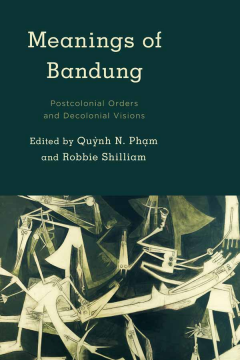
Additional Information
Book Details
Abstract
The Bandung Conference was the seminal event of the twentieth century that announced, envisaged and mobilized for the prospect of a decolonial global order. It was the first meeting of Asian and African states, most of which were newly independent, to promote Afro-Asian economic and cultural cooperation and to oppose colonialism or neocolonialism by any nation.
This book focuses on Bandung not only as a political and institutional platform, but also as a cultural and spiritual moment, in which formerly colonized peoples came together as global subjects who, with multiple entanglements and aspirations, co-imagined and deliberated on a just settlement to the colonial global order. It conceives of Bandung not just as a concrete political moment but also as an affective touchstone for inquiring into the meaning of the decolonial project more generally. In sum, the book attends to what remains woefully under-studied: Bandung as the enunciation of a different globalism, an alternative web of relationships across multiple borders, and an-other archive of sensibilities, desires as well as fears.
Meanings of Bandung is an outstanding collection of essays that, from a variety of vantage points, engage anti-colonial sensing of that world-shaping event in 1955, as well as its decolonizing legacies. The collection provides a brilliantly illuminating window into a diversity of international relations and world orders. It is a must read for all who seek to think international relations otherwise than as an American social science--and even more importantly for those who do not.
Raymond Duvall, Professor of Political Science, University of Minnesota
It is not frequent to read, in the social sciences, expressions such as “The Meanings of Bandung” and “Sensing Bandung,” as this excellent volume unapologetically does. The Bandung Conference is the equivalent to the French Revolution for the history of Europe. Bandung was a signpost and will remains so for the growing presence in the planetary scene of people, states and regions, shattered by the consolidation of Eurocentrism to which the French Revolution contributed so much.
Walter D. Mignolo, William H. Wannamaker Professor and Director, Center for Global Studies and the Humanities
Quỳnh N. Phạm is a PhD candidate in Political Science at the University of Minnesota. Her publications include “Enduring Bonds: Politics and Life Outside Freedom as Autonomy,” Alternatives and co-authored articles with Himadeep Muppidi in Arlene Tickner and David Blaney, Claiming the International (Routledge), Tarak Barkawi and Keith Stanski, Orientalism and War (Columbia University Press), and Naeem Inayatullah, Autobiographical International Relations: I, IR (Routledge).
Robbie Shilliam is author of The Black Pacific (Bloomsbury Academic Press) and German Thought and International Relations (Palgrave). He is co-convener of the BISA Colonial, Postcolonial and Decolonial Working group, a correspondent of the Transnational Decolonial Institute, and co-editor of the book series Kilombo: International Relations and Colonial Questions (Rowman & Littlefield International).
Robbie Shilliam and Quynh N. Pham place the lens on an iconic moment for the postcolonial world in global politics. Invaluable for both research and teaching, this collection of essays reveals the layers of meaning contained in this moment, as well as the paradoxes and tensions faced by those who sought to recreate the international beyond the legacies of the colonial era.
Vivienne Jabri, Professor, King’s College London
Meanings of Bandung takes up one of the most significant and undervalued moments in the history of international relations when anti-colonial politics intersected with decolonial visions to produce some of the most inspired possibilities for a truly global politics. A formidable collection of critical and postcolonial International Relations scholars examines the multivalent politics, aesthetics, and ethics that emerged from the 1955 Bandung Conference when leaders of newly independent African and Asian states dared to imagine an alternative global order in which global peace, social justice, and human dignity were more than just rhetorical masks for the exercise of realpolitik. Readers will come away both inspired and humbled by the sharp analyses and profound lessons that Bandung continues to provide us for crafting more just and plural worlds in our contemporary times. This volume should be a must-read for all students of International Relations.
Shampa Biswas, Paul Garrett Professor, Whitman College
Sixty years ago, the Bandung Conference seemed to open up the possibility of a new world of racial equality and global justice. But as this valuable collection makes clear, the event also had even more far-reaching aspirations. Bandung offered a revolutionary decolonial revisioning of the affective sensibilities, dominant temporalities, and official corporealities of the planetary body politic. It is a vision we urgently need to recover.
Charles W. Mills, CUNY Graduate Center
This pioneering volume retrieves Bandung’s entangled histories. By combining work on the intimate solidarities that sustained the conference along with chapters on the importance of Bandung for narrating conspicuously global histories, Meanings of Bandung represents a major advance. The book will be of significant interest to those working on colonial and post-colonial histories, the politics of development, and the terrain of ‘lived’ international relations.
George Lawson, Associate Professor, London School of Economics
